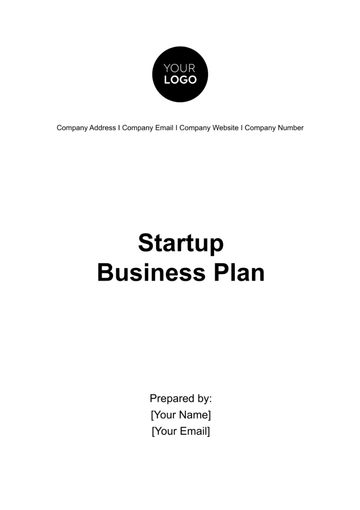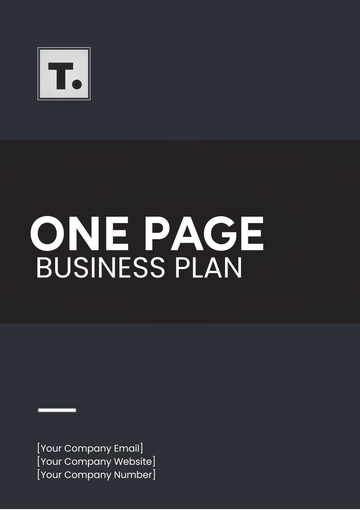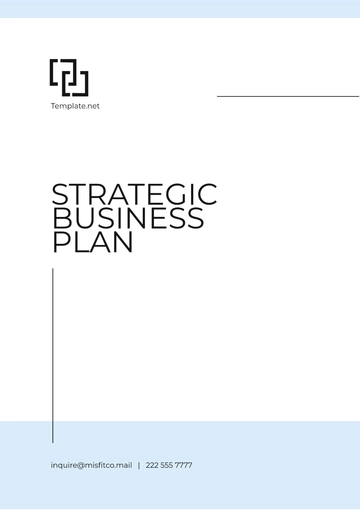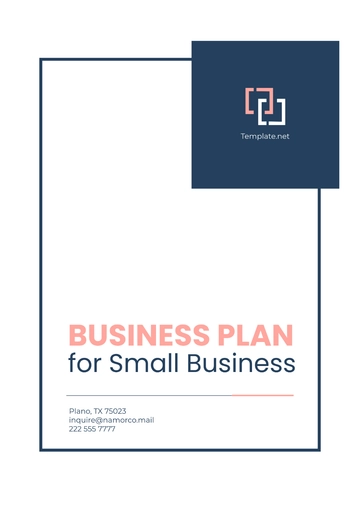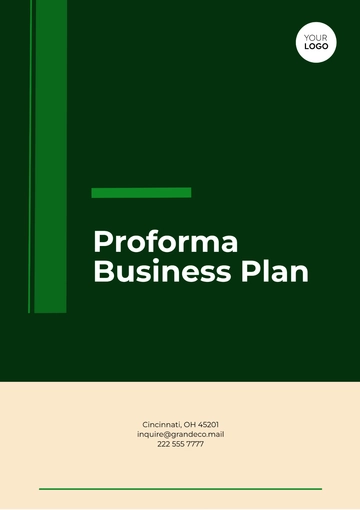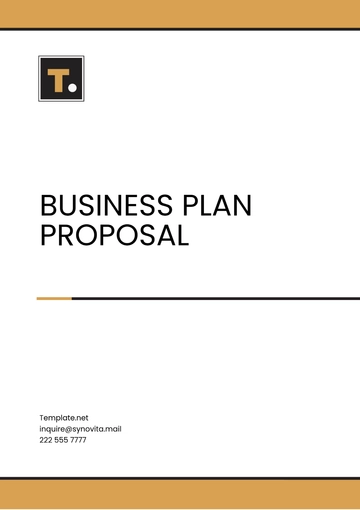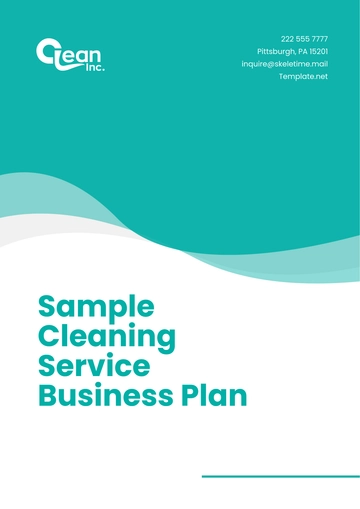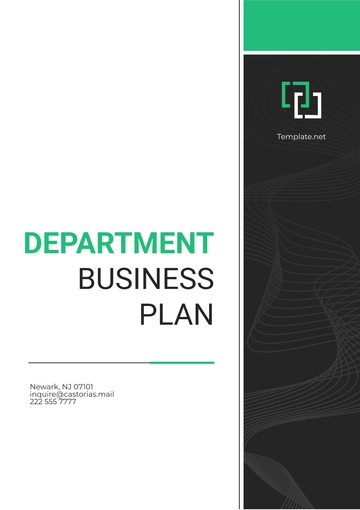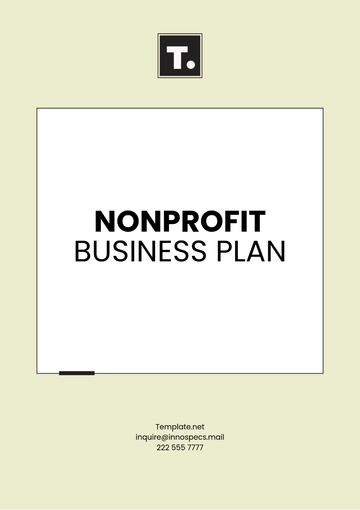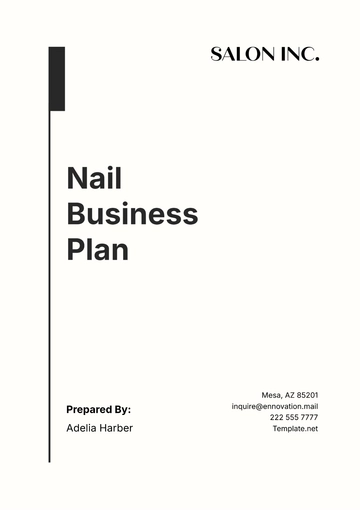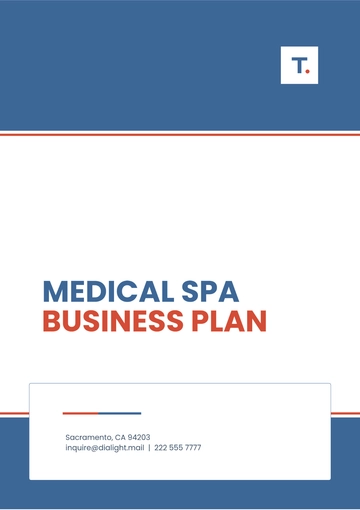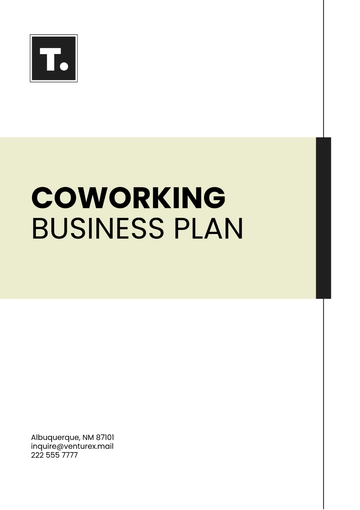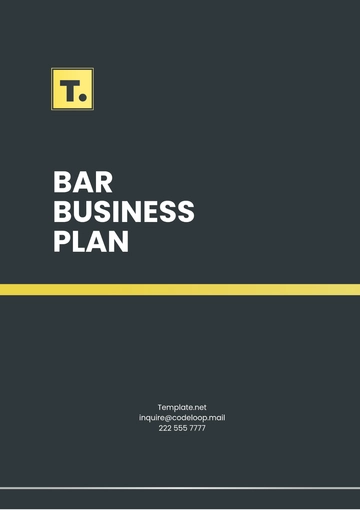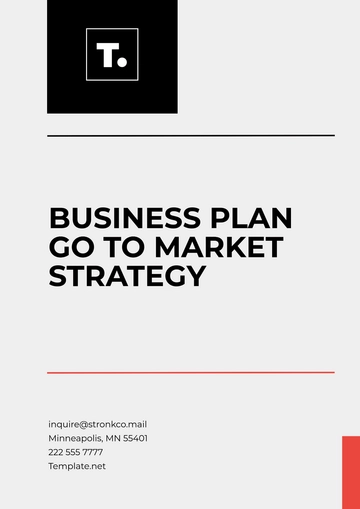Free Annual Marketing Business Plan
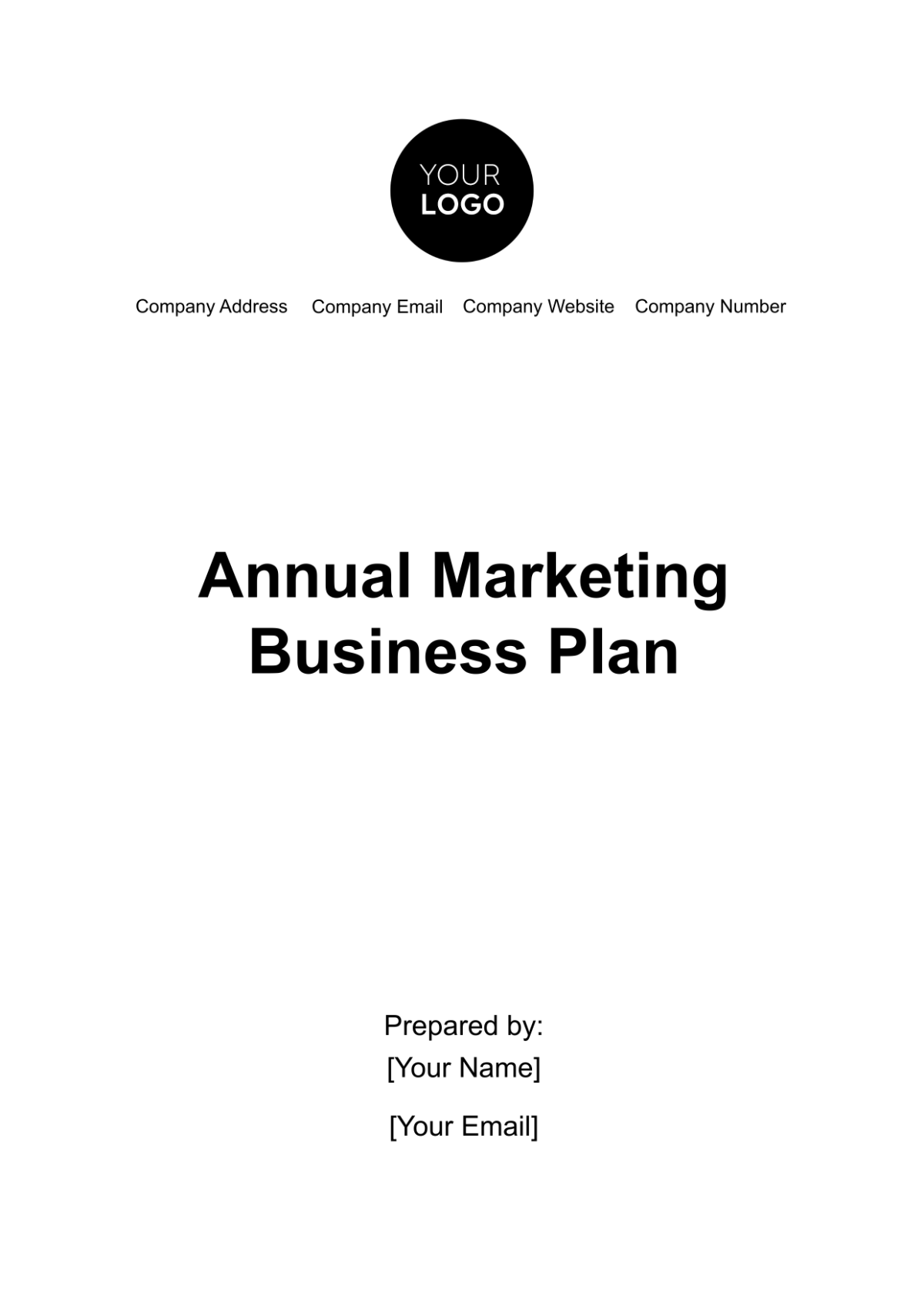
I. Executive Summary
This annual business plan outlines the strategic marketing objectives and plans for [Your Company Name] for the year [2050]. It serves as an overview of the goals, target markets, marketing strategies, and financial expectations for the company’s marketing efforts throughout the year.
A. Company Overview
[Your Company Name] aims to enhance its market presence and drive substantial growth in [2050] by focusing on customer acquisition, brand awareness, and digital transformation. The primary goal is to increase market share by [20%] and boost revenue by [30%] through targeted marketing campaigns, strategic partnerships, and innovative digital marketing tactics.
B. Target Markets
[Your Company Name] will focus on expanding its presence in three key markets:
Technology Sector: Targeting tech startups and established companies looking for advanced marketing solutions.
Healthcare Sector: Focusing on healthcare providers and pharmaceutical companies needing specialized marketing strategies.
E-commerce Sector: Aiming at online retailers and e-commerce platforms to improve their customer engagement and sales conversions.
C. Marketing Strategies
The company will combine digital marketing, content marketing, and partnership strategies to achieve its objectives. A detailed budget and resource allocation plan will guide these efforts to ensure maximum ROI.
II. Market Analysis
A comprehensive market analysis is essential to understand the current market dynamics, competitive industry, and customer needs. This section provides insights into the key market trends, opportunities, and challenges that will shape [Your Company Name]'s marketing strategies for [2050].
A. Market Trends
Digital Transformation: The increasing shift towards digital platforms necessitates a strong focus on digital marketing strategies, including social media, SEO, and content marketing.
Personalization: Customers are demanding more personalized experiences, making it crucial to tailor marketing efforts to specific customer segments.
Sustainability: There is a growing trend towards sustainability, with customers preferring brands that demonstrate environmental and social responsibility.
B. Competitive Analysis
Major Competitors: Identify key competitors in the market, including their strengths, weaknesses, and market positioning. Analyze their marketing strategies to identify opportunities for differentiation.
SWOT Analysis: Conduct a SWOT analysis to assess [Your Company Name]’s strengths, weaknesses, opportunities, and threats in the current market.
C. Customer Analysis
Customer Segmentation: Segment the target market based on demographics, psychographics, and behavioral factors to better understand customer needs and preferences.
Customer Pain Points: Identify common customer pain points that [Your Company Name] can address through its marketing solutions.
Customer Journey: Map out the customer journey to identify key touchpoints where marketing efforts can be most effective.
III. Marketing Objectives
Clearly defined marketing objectives are essential for guiding [Your Company Name]'s marketing efforts throughout the year. This section outlines the specific, measurable, achievable, relevant, and time-bound (SMART) objectives that will drive the company’s marketing strategy in [2050].
A. Primary Objectives
Increase Brand Awareness: Achieve a [50%] increase in brand visibility across key digital platforms by [Q4 2050].
Lead Generation: Generate [30%] more qualified leads compared to the previous year through targeted marketing campaigns.
Customer Retention: Improve customer retention rates by [15%] by enhancing customer engagement and satisfaction.
Sales Conversion: Increase sales conversion rates by [20%] by optimizing the customer journey and implementing effective call-to-action strategies.
B. Secondary Objectives
Expand Social Media Presence: Grow social media following by [40%] and increase engagement rates by [25%].
Content Marketing: Develop and distribute high-quality content to increase website traffic by [35%] and improve SEO rankings.
Partnerships: Establish strategic partnerships with at least five key industry players to enhance market reach and credibility.
Market Penetration: Enter [two] new geographic markets and achieve a [10%] market share in each by the end of [2050].
IV. Marketing Strategies
This section outlines the specific marketing strategies that [Your Company Name] will implement to achieve its objectives. These strategies include digital marketing, content marketing, and partnership initiatives designed to enhance brand visibility, generate leads, and drive sales growth.
A. Digital Marketing Strategy
SEO and SEM: Invest in search engine optimization (SEO) and search engine marketing (SEM) to increase organic and paid search visibility.
Social Media Marketing: Utilize platforms like LinkedIn, Twitter, and Instagram to engage with the target audience, share content, and build brand loyalty.
Email Marketing: Implement personalized email marketing campaigns to nurture leads and retain existing customers.
B. Content Marketing Strategy
Blogging: Publish high-quality, relevant blog posts that address customer pain points and establish [Your Company Name] as a thought leader.
Video Marketing: Create and distribute video content, including tutorials, webinars, and customer testimonials, to engage the audience and demonstrate expertise.
Whitepapers and E-books: Develop in-depth whitepapers and e-books on industry topics to capture leads and provide valuable insights to potential customers.
C. Partnership Strategy
Strategic Alliances: Form partnerships with industry influencers, technology providers, and other relevant organizations to expand market reach.
Co-marketing Initiatives: Collaborate with partners on joint marketing campaigns, such as webinars, events, or content creation, to leverage shared audiences.
Referral Programs: Establish a referral program to incentivize existing customers and partners to refer new clients to [Your Company Name].
V. Budget Allocation
A well-defined budget is crucial for executing marketing strategies effectively. This section provides a detailed breakdown of the marketing budget for [2050], ensuring that resources are allocated efficiently to maximize ROI.
Category | Budget Allocation | Details |
|---|---|---|
Digital Marketing | $500,000 | Includes SEO, SEM, social media marketing, and email campaigns. |
Content Marketing | $250,000 | Covers content creation, video production, and distribution. |
Partnerships | $150,000 | Budget for forming strategic alliances, co-marketing initiatives, and referral programs. |
Marketing Technology | $100,000 | Investment in marketing automation tools, CRM software, and analytics platforms. |
Events and Sponsorships | $200,000 | Costs associated with attending, hosting, or sponsoring industry events and conferences. |
Market Research | $75,000 | Allocation for conducting market research, surveys, and customer analysis. |
Miscellaneous | $50,000 | Reserve fund for unforeseen expenses or additional marketing activities. |
Total Marketing Budget | $1,325,000 | Total estimated cost for executing the annual marketing plan. |
This budget allocation ensures that [Your Company Name] can execute its marketing strategies effectively, with a focus on digital marketing, content creation, and strategic partnerships. The budget also includes provisions for market research and technology investments, ensuring that the company remains competitive and innovative.
VI. Risk Management
Identifying and mitigating risks is crucial for the successful execution of the marketing plan. This section outlines the potential risks associated with the marketing strategies and the steps that will be taken to minimize their impact.
A. Financial Risks
Budget Overruns: Monitor expenses closely and adjust the budget as necessary to prevent overspending. Establish a reserve fund to cover unexpected costs.
Revenue Shortfalls: Implement contingency plans, such as scaling back certain campaigns, if revenue targets are not met. Diversify funding sources to reduce dependency on any single stream.
Return on Investment (ROI): Regularly assess the effectiveness of marketing activities to ensure that they are delivering the expected ROI. Reallocate resources from underperforming initiatives to more successful ones.
B. Operational Risks
Resource Constraints: Ensure that the marketing team has sufficient resources, including personnel and technology, to execute the plan effectively. Outsource tasks when necessary to manage workload.
Campaign Failures: Test campaigns on a smaller scale before full implementation to reduce the risk of failure. Be prepared to pivot strategies if initial results are not promising.
Market Fluctuations: Stay informed about market trends and adjust strategies accordingly to remain competitive. Flexibility is key to adapting to changing market conditions.
C. Reputational Risks
Public Relations Issues: Develop a crisis communication plan to address any negative publicity or PR issues that may arise. Respond quickly and transparently to maintain trust.
Brand Perception: Regularly monitor brand perception through customer feedback and social media sentiment analysis. Address any issues that could negatively impact the brand.
Customer Dissatisfaction: Ensure that marketing promises align with the actual customer experience to avoid dissatisfaction. Engage with customers regularly to gather feedback and improve services.
VII. Performance Metrics
Tracking the performance of marketing activities is essential to measure success and identify areas for improvement. This section outlines the key performance indicators (KPIs) that [Your Company Name] will use to evaluate the effectiveness of its marketing strategies.
A. Digital Marketing Metrics
Website Traffic: Monitor the number of visitors to the company website and the sources of traffic (e.g., organic, paid, referral).
Conversion Rate: Measure the percentage of website visitors who take a desired action, such as filling out a form or making a purchase.
Social Media Engagement: Track likes, shares, comments, and follower growth across all social media platforms.
B. Content Marketing Metrics
Content Reach: Analyze the number of views, shares, and downloads of content such as blog posts, videos, and whitepapers.
Lead Generation: Evaluate the number of leads generated through content marketing efforts, including gated content and lead magnets.
SEO Rankings: Track keyword rankings and organic search visibility for targeted terms.
C. Partnership Metrics
Referral Traffic: Measure the amount of website traffic generated through referral programs and partnerships.
Joint Campaign Success: Evaluate the performance of co-marketing initiatives, including lead generation and brand awareness.
New Client Acquisition: Track the number of new clients acquired through partnerships and strategic alliances.
D. Financial Metrics
Marketing ROI: Calculate the return on investment for each marketing campaign to ensure that spending is generating the desired results.
Cost Per Lead (CPL): Measure the cost-effectiveness of lead generation efforts by calculating the average cost per lead.
Revenue Growth: Track overall revenue growth as a result of marketing activities, with a focus on meeting the annual target of a [30%] increase.
VIII. Budget Schedule
The budget schedule outlines the timeline for allocating and spending the marketing budget throughout the year. This ensures that funds are available for each phase of the marketing plan and that expenditures are managed efficiently.
Quarter | Activity | Budget Allocation |
|---|---|---|
Q1 (Jan-Mar) | Digital Marketing Campaigns | $200,000 |
Q2 (Apr-Jun) | Content Creation and Distribution | $175,000 |
Q3 (Jul-Sep) | Strategic Partnerships and Events | $275,000 |
Q4 (Oct-Dec) | Market Research and Technology Upgrades | $150,000 |
Ongoing | Miscellaneous and Contingency Fund | $50,000 |
Total | Annual Marketing Budget | $1,325,000 |
This budget schedule ensures that [Your Company Name] can execute its marketing plan effectively by distributing funds throughout the year according to the planned activities. It allows for flexibility and contingency planning to address any unforeseen expenses.
IX. Seminar Schedule
To support continuous learning and professional development, [Your Company Name] will host a series of seminars throughout the year. These seminars will focus on the latest marketing trends, tools, and strategies, providing valuable insights for the team and stakeholders.
Date | Seminar Topic | Target Audience |
|---|---|---|
[Month Day, Year] | Digital Marketing Trends for 2050 | Marketing Team |
[Month Day, Year] | Advanced Content Marketing Strategies | Content Creators |
[Month Day, Year] | Building Effective Partnerships | Partnership Managers |
[Month Day, Year] | Measuring Marketing ROI | Financial Analysts |
[Month Day, Year] | Monthly Webinars | All Employees |
This seminar schedule is designed to ensure that the team remains up-to-date with the latest marketing trends and strategies. The seminars will enhance the skills of employees and provide them with the knowledge needed to execute the marketing plan successfully.
X. Conclusion
The [2050] marketing plan for [Your Company Name] is a comprehensive approach to achieving significant growth and market presence. By focusing on digital transformation, customer engagement, and strategic partnerships, the company aims to increase market share, revenue, and brand visibility. The plan ensures that the marketing efforts are effective and aligned with the company’s objectives. With a well-structured plan in place, [Your Company Name] is well-positioned to navigate the competitive industry and achieve its marketing goals in [2050].
- 100% Customizable, free editor
- Access 1 Million+ Templates, photo’s & graphics
- Download or share as a template
- Click and replace photos, graphics, text, backgrounds
- Resize, crop, AI write & more
- Access advanced editor
Strategize your yearly goals with our Annual Marketing Business Plan Template from Template.net. Fully customizable and editable, this template features a comprehensive and professional layout. Effortlessly personalize the plan, editable in our Ai Editor Tool, to outline marketing objectives, strategies, and budgets. Perfect for setting a clear direction for your marketing efforts.
You may also like
- One Page Business Plan
- Coffee Shop Business Plan
- Restaurant Business Plan
- Food Business Plan
- Real Estate Business Plan
- Executive Summary Business Plan
- Cover Page Business Plan
- Nonprofit Business Plan
- Daycare Business Plan
- Construction Business Plan
- Startup Business Plan
- Medical Business Plan
- Bakery Business Plan
- Service Plan
- Hotel Business Plan
- Catering Business Plan
- School Business Plan
- Healthcare Business Plan
- Transportation Plan
- Sports Plan
- Car Wash Business Plan
- Salon Business Plan
- Clothing Business Plan
- Farming Business Plan
- Boutique Plan
